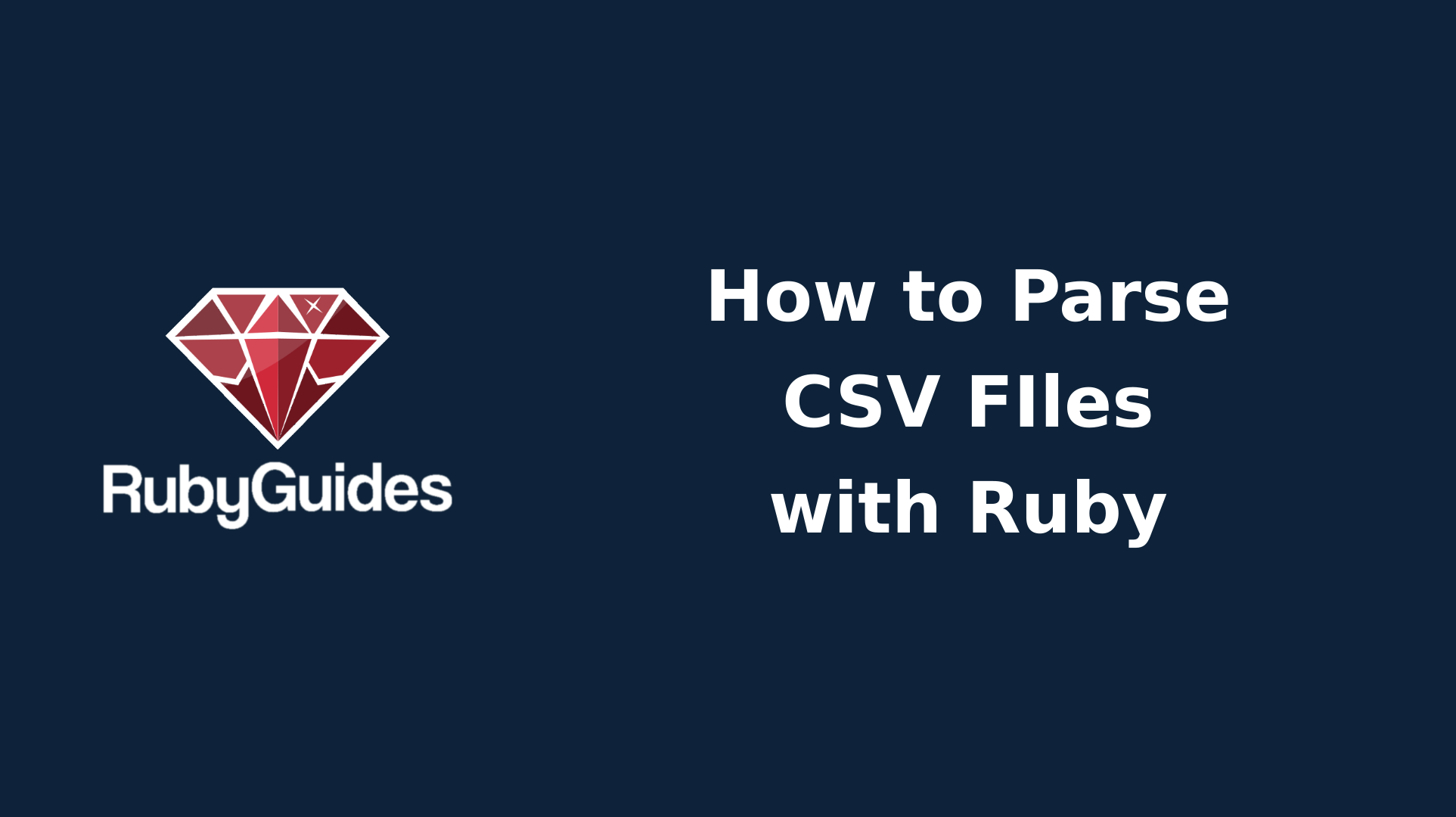Ruby Csv Read
Ruby Csv Read - New ( io, options ) #. [foo, 0] [bar, 1] [baz, 2] method csv.table returns the entire csv. Web with ruby >= 1.9 you can use. Each do | row | #. Io object should be open for read csv. New (string_or_io, ** options) # reading: Require 'csv' csv = csv.read ('test.csv', :headers=>true) p csv ['name'] #=> [raja, mathew, harin, soumi] #or even: End # or row = csv.shift # writing: Web the first line in the code below require csv makes ruby’s csv library available to your program so that you can then use the class csv. Ruby is a language primarily optimized for people, not computers.
New ( io, options ) #. Foreach (path) do | row | p row end. Use github releases and dicsussions 2 months ago benchmark reduce benchmark time 4 years ago bin overrided boilerplate by bundle init cmath 6 years ago doc/ csv End # or row = csv. Web acces by cols: Require 'csv' csv = csv.read ('test.csv', :headers=>true) p csv ['name'] #=> [raja, mathew, harin, soumi] #or even: Csv reading and writing master 2 branches 33 tags code kou bump version e090da1 on jun 25 713 commits.github ci release: Something like this would work: Write ('t.csv', name,value\nfoo,0\nbar,1\nbaz,2) # run the ruby code with csv filename as argument. Web the first line in the code below require csv makes ruby’s csv library available to your program so that you can then use the class csv.
Web the ruby csv library lets you specify the field delimiter. T = csv.table ('test.csv') p t [:no1] #=> [77489, 77559, 77787, 77251]. This file should be stored in the same directory as your ruby. Csv.open (file_path) { |csv| csv.readline }, which only reads oneline. Ruby is a language primarily optimized for people, not computers. New ( io, options ) #. Foreach (path) do | row | p row end. [ foo , 0 ] [ bar , 1 ] [ baz , 2 ] method csv.table returns the entire csv data as a csv… 0.04 mb **************** time and memory usage with csv.read: Require 'csv' csv = csv.read ('test.csv', :headers=>true) p csv ['name'] #=> [raja, mathew, harin, soumi] #or even:
Ruby Convert CSV File to Two Dimensional Array DEV Community
20m **************** time and memory usage with csv.foreach: Require 'csv' csv = csv.read ('test.csv', :headers=>true) p csv ['name'] #=> [raja, mathew, harin, soumi] #or even: Web method csv.read returns the entire csv data: On each iteration the variable row is going to be an array. New ( io, options ) #.
Ruby入門!CSVファイルを読み込んでみよう! TECH PLAY Magazine
Csv = csv.new (string_or_io, **options) # reading: End # or row = csv. Thus, performance is secondary and convenience is first on the priority. Foreach (path) do | row | p row end. Write ('t.csv', name,value\nfoo,0\nbar,1\nbaz,2) # run the ruby code with csv filename as argument.
Parsing a CSV File in Ruby. CSV stands for comma separated values… by
Use github releases and dicsussions 2 months ago benchmark reduce benchmark time 4 years ago bin overrided boilerplate by bundle init cmath 6 years ago doc/ csv Web the ruby csv library lets you specify the field delimiter. The most generic interface of the library is: End # or row = csv.shift # writing: Read (path) # => [[foo, 0],.
Ruby csv write hash 461706Ruby csv write hash
Thus, performance is secondary and convenience is first on the priority. Web method csv.read returns the entire csv data: Require 'csv' csv = csv.read ('test.csv', :headers=>true) p csv ['name'] #=> [raja, mathew, harin, soumi] #or even: Read (path) # => [[foo, 0], [bar, 1], [baz, 2]] method csv.foreach iterates, passing each row to the given block: T = csv.table ('test.csv').
[Solved] Ruby read CSV file as UTF8 and/or convert 9to5Answer
Web the first line in the code below require csv makes ruby’s csv library available to your program so that you can then use the class csv. It offers tools to enable you to read and write to and from strings or io objects, as needed. New ( io, options ) #. The syntax for reading a csv file is.
How to Read & Parse CSV Files With Ruby RubyGuides
The initial training cost and usage cost: Web how to read a big csv file without losing your sanity. Foreach (path) do | row | p row end. Read (path) # => [[foo, 0], [bar, 1], [baz, 2]] method csv.foreach iterates, passing each row to the given block: Csv and character encodings (m17n or multilingualization) this new csv parser is.
GitHub ruby/csv CSV Reading and Writing
Web method csv.read returns the entire csv data: Foreach (path) do | row | p row end. Csv.open (file_path) { |csv| csv.readline }, which only reads oneline. File_contents = csv.read (csvfile.csv, col_sep: Each do | row | #.
よく分からない Ruby の CSVread と CSVopen の違い · Issue 2526 · YumaInaura
Web sep 12, 2018 at 20:29 no, it's equivalent to: Web # put ruby code into a file. Foreach (path) do | row | p row end. The initial training cost and usage cost: Web the ruby csv library lets you specify the field delimiter.
[Solved] Ruby unable to parse a CSV file 9to5Answer
The initial training cost and usage cost: 20m **************** time and memory usage with csv.foreach: Web the most generic interface of the library is: End # or row = csv. Each do | row | #.
End # Or Row = Csv.shift # Writing:
On each iteration the variable row is going to be an array. The syntax for reading a csv file is as follows: Web with ruby >= 1.9 you can use. Web the most generic interface of the library is:
Csv Reading And Writing Master 2 Branches 33 Tags Code Kou Bump Version E090Da1 On Jun 25 713 Commits.github Ci Release:
Web ruby a guide to the ruby csv library, part i ruby on rails darko gjorgjievski january 30, 2014 share several weeks ago i needed to do something in ruby that involved processing a large. [ foo , 0 ] [ bar , 1 ] [ baz , 2 ] method csv.table returns the entire csv data as a csv… New ( io, options ) #. It offers tools to enable you to read and write to and from strings or io objects, as needed.
This Class Provides A Complete Interface To Csv Files And Data.
The most generic interface of the library is: Write ('t.csv', name,value\nfoo,0\nbar,1\nbaz,2) # run the ruby code with csv filename as argument. Io object should be open for write csv. Read (with gets () or each ()) from and write (with <<) to csv here.
New ( Io, Options ) #.
Csv.open (file_path) { |csv| csv.readline }, which only reads oneline. Read (with gets () or each ()) from and write (with <<) to csv here. File_contents = csv.read (csvfile.csv, col_sep: The initial training cost and usage cost:






